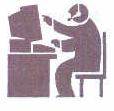
THE ISLE OF WIGHT RADIO SOCIETY
THE NEWS LETTER
October 2001
Web Site...
CQ
CQ CQ de G3SKY G3SKY G3SKY 
The following members are are fully paid up, card carrying members of the Isle of Wight Radio Society. Alan Reeves, Alan Ash, Brian Pebody, John Francis, Mike Shotter, Terry Lishman, Paul Legge, David A'Bear, Michael Griffin, Steve Symonds, Bob Williams, Trevor Parker and Joyce Coalston. A very special thanks to Michael Griffin, who although a white stick operator continues to give his support to the IWRS and to Joyce who continues the membership in memory of her late husband Larry.
A
New structure for Amateur Radio Licensing 
in the United Kingdom...
The Radiocommunications Agency announced today (21st September) a series of changes to the radio amateur licensing regime, designed to make it more attractive as a technical hobby. The changes include lowering the Morse Code speed requirement for full licensees, amalgamating some licence categories, allowing trainees to operate while supervised before passing an examination and the introduction of a new Foundation Class licence.
UK Class A and Class AIB Licences
To this end the Agency intends with effect from 1st October 2001 to reduce the Morse requirement for the Class A licence to five wpm and to incorporate the Class A/B into the Class A licence. Class A/B licence holders will be offered the choice of either retaining their existing M5 callsign or change to a M0 callsign. Additionally, to encourage the practical aspect of amateur radio training, unlicensed trainees (on a registered training course) may be supervised by full Licence holders to operate a station and contact other UK licensed amateurs. There will be no time limit on the duration of any message.
Novice Licence
With effect from 1st October 2001 the Novice Amateur Radio Licence will be renamed the Intermediate Amateur Radio Licence. Intermediate (A) licences will be allowed access to all amateur bands. Intermediate (B) licensees will be allowed access to all amateur bands at 50MHz and above. All Intermediate licensees will be allowed 50 watts output in all bands except where a lower power limit already applies to Amateur (A) licensees, in which case the lower limit will apply.
Foundation Licence
The final change to the amateur radio licensing structure prior to WRC 2003 will be the introduction of a new “Foundation" licence at the beginning of 2002. This licence will provide access to most amateur bands, and will restrict licensees to a maximum RF out put power of 10 wafts Transmitting equipment will need to be commercially manufactured items, or properly designed commercial kits. Study for this licence may be taken over a weekend, and is based on the tradition that amateur radio is a hobby learnt mainly through self-training. The Foundation syllabus is based on the concept of producing "safe and Competent" radio amateurs.
With effect from 1st October 2001, pilot courses will be run to evaluate the syllabus and training material, and the agency expects the full scheme to be operational from January 2002. It is intended that as from 1st January 2004, a revised integrated structure of qualifications and examinations for amateur radio in the UK will come into effect.
Good Man Wanted.
During the past year I have had a number of family commitments which I had hoped would have resolved themselves by now. Unfortunately this has not proved to be the case and if anything, my family commitments have increased. I regret that I have been unable to carry out the duties or the dedication of club secretary as were so obvious in past club secretaries. I therefore consider it essential for the future of the club that members now consider appointing a new secretary..
I hope to continue attending as a member of the club, but this will depend on a number other commitments.
The New Licensing Structure
There will no doubt be much discussion between radio amateurs regarding the new licensing structure. Apart from 2 mtrs I very seldom use phone, however I do have some 2,500 plus Morse QSO's during the course of a year I mention this only because I fail to see why there is any need to keep the Morse requirement. Apart from that, anything that promotes amateur radio is to be welcomed. There will be some “Old Timers" who won't agree. But just remember that a small amateur population would make the cost of amateur radio equipment very expensive indeed.

Back in August a team of members renewed the remainder of the felt roof. We thank them for their effort, now we need some interior painting to cover the water marks caused by the leaks!
Morse by Internet
Thanks to MorseMail, a free programme written by Harry AB7TB it is now possible to send and receive recorded messages by Morse over the Internet. This can be sent by e-mail between a station using the same programme or via a repeater-through which stations may work each other almost instantaneously in the "transceive" mode. The Morse Mail programme is simple and stand-alone. There is no fancy installation required. Just download it as a zip or .exe file from the site Gone... Put it in some handy directory, make a shortcut and you are ready to go. MorseMail requires Windows 95,98 or 2000 and a 16-bit sound card to operate properly, but it takes up only a quarter megabyte of disk space and runs with any modest CPU and Ram resources. The mouse buttons can be used for keying or as a straight key or as an iambic keyer If you require more details then I will be pleased to pass them on. The repeater function operates through a HTTP server "brasspounder.com”
The
Friday night meetings are usually well attended with interesting
discussions and recently some computer tuition/problem solving.
The radio is often used with both SSB and CW contacts being made ![]()
By the way the club net operates on a Thursday at 2030 local time on 145.375 Mhz. See you there!